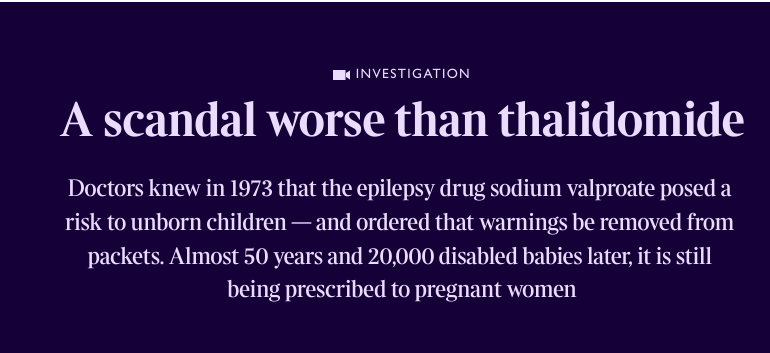The human factor

Another maternity scandal, this time a long-standing one which has, according to this story in the Sunday Times, been going on for ca. 50 years. Pregnant women suffering from epilepsy have been given a drug – sodium valproate – which (while effective at controlling epilepsy) is teratogenic, causing life-changing physical and neurological deformities to children. Its effects on the unborn child have been known about for some time but it continues to be prescribed. The risks were known to the manufacturer (Sanofi) but despite the relevant medical authorities being aware, women were not informed and no studies were done to assess how serious the risks might be. Even when reports of deformities started to come in from the 1980’s onwards, the medical authorities were slow to act – either in setting up studies or in informing women of the risks. It took until 2017 before a proper review was done with a view to the families getting compensation. Despite that report and a subsequent one in 2020 by Baroness Cumberledge recommending compensation, this has been refused by the government.
This story is very similar to the thalidomide scandal and the tainted blood scandal: persons in a position of vulnerability being given medicine or treatment which caused harm despite the authorities knowing of the risks. Then having to fight for years before learning the truth about what happened, why and getting help and compensation. It takes endless campaigning by families, journalists and MPs before the authorities are finally pressured into a – far too late – approximation of decent behaviour to those who have suffered through no fault of their own (and sometimes not even then).
Mistakes will always happen, even in the best run organisation. It happens in medicine. It happens in the criminal justice system. The state can – and does – get things wrong. It does not much matter whether they happen because of incompetence or a breach of the rules or negligence or inadequate systems or simple human error or a failure to join up information which is known or a failure to act. Important as the reasons are, especially for the inquiries and investigations and the authorities, what really matters is this: innocent people suffer as a result of those mistakes. Much as it is important to establish the reasons why, to apportion responsibility, to hold people accountable, to come up with process or other improvements and to learn the lessons, what matters first is to help those who have suffered and are continuing to suffer. Those individuals and their families should be the focus of the government’s actions. Too often, they aren’t.
In criminal justice, it has now become even harder than it was to get compensation for a miscarriage of justice. In medical matters – such as this case – it can take years to get compensation and help. It is a grotesque mixture of cruelty and indifference. Unless you have had a very sick or disabled child, especially when there is little chance of improvement or recovery, it is hard to realise how immensely tiring this is, how it sucks out the oxygen from a family, from a marriage, how the burden of caring – however loved and cared for they are – limits opportunities and lives, how it ruins hopes and consumes physical and emotional energy, every single day. To impose on top of that the burden of having to fight for knowledge, for compensation, for help is unconscionable.
Why does the state react in this way? Many reasons no doubt. But one of them is surely the desire to save face.
It harms an institution’s self-image and, often, of senior people within it. “We got it wrong.” is hard to say. If “we get it wrong” what sort of a “we” are we, really? Think of judges and lawyers, whose self-esteem was so bound up in the system they had worked all their lives in, unable to accept that it had failed so badly that innocent people spent decades in prison for crimes they had not committed, an attitude chillingly expressed by Lord Denning in relation to the Irish miscarriages of justice in the 1970’s. Or the belief that being a public service – such as the NHS – will somehow automatically make an organization behave well and put the public’s interests first when these clash with those of the institution and those working in it. The shame of having to admit that your actions or inactions have been responsible for the suffering of others can drive this defensiveness and indifference. And if it was all the result of actions long ago, how easy it is to think that it is not your responsibility now. It is a very common feature of scandals old and new, as described here.
It is foolish too. Medical conspiracy theories abound these days. Far too many people mistrust the authorities over vaccines. Refusing to compensate those harmed when the authorities make disastrous mistakes is precisely the wrong way to rebuild trust. Why take a risk if the state then abandons you if the risk is realised?
When the Cumberledge report came out in July 2020, the then junior Health Minister apologised unreservedly and said how shocked she was. Well, lah-di-dah. How does that help the families worrying about how their children will be looked after when they are gone? The French government has taken a different view, setting up a compensation fund for affected families. Baroness Cumberledge said this: “A decent society has a duty to help people who are suffering so much. Such a scheme need not be a blank cheque; a comparatively modest sum would provide the support that these families so desperately need. I hope the government will do the right thing and act now.” She’s right. The government should do the decent thing.